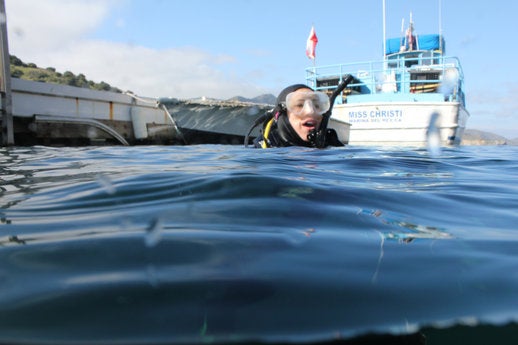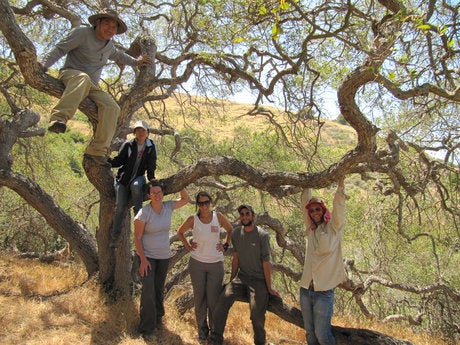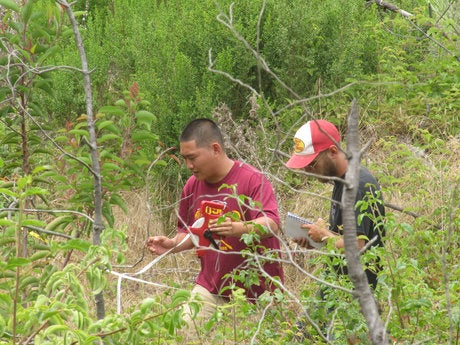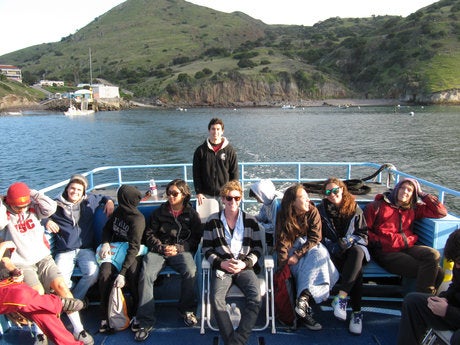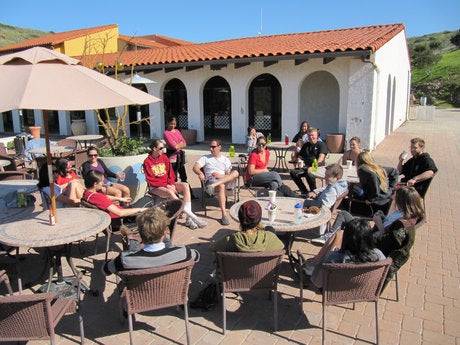The Environmental Studies Department offers various courses around the world to enhance the students’ understanding of environmental topics through field experiences. The following courses are typically offered to students during the summer or Maymester periods. More information about the programs described below can be found by viewing the photo albums to the right and reading about student experiences under the “People” tab. Visit the Catalina Residential College website to learn more about courses at the Wrigley Institute on Catalina Island.
ENST 298: Introduction to Scientific Diving – 2 units
Covers range of topics from physics and physiology of scuba diving and dive emergency training to advanced research and survey skills. Prereqs: MUST submit dive medical forms and be scuba certified prior to enrollment.
Here’s a video featuring past ENST-298 students.
If you have questions or need additional details you can e-mail Jill Sohm at sohm@usc.edu.
Summer ENST 320aL on Catalina Island: Water and Soil Sustainability (Catalina Residential College in July)
ENST 320aL In the Field is a special section of the Water and Soil Sustainability course (currently taught on the University Park Campus). ENST 320aL In the Field will be conducted on the USC Wrigley Marine Science Center (WMSC) with enhanced research, lab and field studies. A focus on island sustainability is included with projects related to water and energy sustainability at the WMSC. Students will also explore this issue by speaking with community leaders and resource managers in the waste, power, and water fields.
To learn more about the program, email Professor Scott Applebaum at sappleba@usc.edu.
Summer ENST 320b on Catalina Island: Energy and Air Sustainability (Catalina Residential College in July)
Summer ENST 320b is the special section of the Energy and Air Sustainability course (currently taught on the University Park Campus). For four weeks, at USC’s Wrigley Marine Science center on Catalina Island, students in this Julymester will get an immersive, hands-on look at energy production and distribution on the island. Typical coursework will be supplemented with lab activities, field trips, and guest lectures from experts in different aspects of traditional and renewable energy.
To learn more about the program, email Professor Victoria Petryshyn at petryshy@usc.edu.
ENST 432 Environment and Governance: Sustainable Development in the Philippines
In September 2015, the Philippines and 192 other United Nations (UN) member states committed to achieving the 17 Sustainable Development Goals (SDGs) and their 169 targets by 2030. The SDGs, also called the Global Goals, have a range of economic, social, environmental, and governance targets. The SDGs present a bold commitment to finish what has been started through the Millennium Development Goals (MDGs) in 2015. The Philippines affirms its commitment to achieving the SDGs by 2030, if not sooner, especially since the SDGS, in their own words, “is in sync with the country’s development plans and long-term aspirations for 2040 (Voluntary National Review of the Philippines SDG Commitments, 2019) .” This course will explore the work the Philippines is doing to reach their SDG targets.
To learn more about the program, email Professor Shannon Gibson at smgibson@usc.edu.
ENST 483L: Coastal Zone Sustainability (Catalina Residential College Maymester)
Students are introduced to field skills and ecosystem management tools used to investigate complex environmental Problems in coastal areas. Students receive training at the USC Wrigley Marine Science Center (WMSC). Learning and research will focus on sustainable development, fisheries management, protected – area planning and assessment, and natural resource governance issues.
If you have questions or need additional details you can email David Ginsburg at dginsburg@usc.edu.
ENST 486: Social Science Research Methods for Environmental Analysis (Catalina Residential College Maymester)
Social science research provides essential insights into environmentally significant human behavior
and perceptions that affect the processes of management and social organization, and that go
towards producing effective environmental policy, communications, and engagement. This applied
social science research methods course will introduce key qualitative and quantitative methods of
collecting and analyzing social data relevant for environmental issues. The class will introduce the
fundamental concepts of qualitative and quantitative social science research i.e., surveys,
interviews, participant observation, and focus groups. Over the course of the term, through in-class
work and hands-on experiential learning opportunities, students will develop research questions,
plan for and collect data using social science methods, and analyze and summarize their findings in
a scientific research report. Further, students will evaluate and discuss the strengths and
weaknesses of qualitative and quantitative approaches; the class will also recognize and account for
ethical issues of human subjects’ research (including informed consent). In keeping with the
thematic focus of “urban oceans”, much of our work will center on California’s Marine Protected
Areas (MPAs), a state policy initiative that has achieved successful ocean conservation outcomes in
the first decade of implementation. This course also will incorporate opportunities to observe and
experience the protected marine environments of Catalina via snorkeling, kayaking, and other
excursions.
ENST 499 Waves of Change: Unearthing Coastal Environmental Histories
In this class, students will use Pimu Catalina Island to explore humanity’s long history with coastal environments. Key themes in our course will include ancient human migration, European exploration and imperialism, environmental colonialism, labor, leisure and tourism, and technology and the environment. Students will engage in original historical research, using narratives, charts, newspapers, photographs, and other archival sources to uncover, understand, interpret, and communicate key stories about the island’s past. In doing so, students will both gain experience with archival research methods and develop insight into how environmental conditions shape and are shaped by human societies over time.
To learn more about the program, email Professor Sean Fraga at sfraga@usc.edu.



